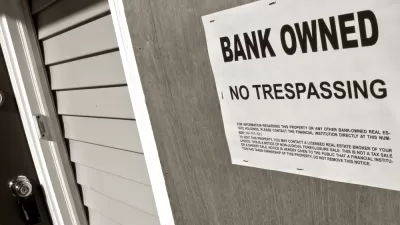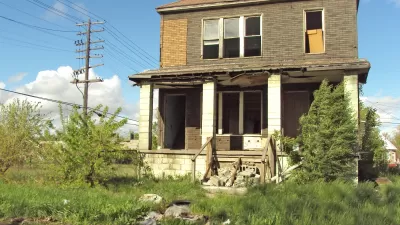A new law makes it impossible for property owners delinquent on their property taxes to bid in a foreclosure auction to keep their homes. Larger, commercial interests are benefitting from the change.
"Each September, Wayne County puts up for auction tens of thousands of properties whose owners are more than three years behind on their property taxes," according to a post by Kriston Capps.
The occasion is something of an anti-holiday in Wayne County, according to Capps, because of how many owners and tenants lose their homes in the process. "This year’s auction—which…runs through September 24—includes more than 8,000 homes occupied by an owner or a tenant, according to the county’s own records." The 8,000 residents losing their homes are casualties in the city's record-high 75,000 tax foreclosures this year. Capps notes that the majority of those foreclosures happen in Detroit.
But, Capps is careful to explain, those numbers don't tell the whole story. The foreclosures indicate a real threat to equity in the county and the city: "Recent changes to the law mean that it’s harder for occupant-owners to bid to save their homes—and easier for buyers to take or keep scores of properties for investment purposes." The bulk of the article is devoted to unpacking the change in the law that regulated tax foreclosures as well as the consequences of those changes.
FULL STORY: How Detroit's Foreclosure Auction Fails Homeowners

Planetizen Federal Action Tracker
A weekly monitor of how Trump’s orders and actions are impacting planners and planning in America.

Congressman Proposes Bill to Rename DC Metro “Trump Train”
The Make Autorail Great Again Act would withhold federal funding to the system until the Washington Metropolitan Area Transit Authority (WMATA), rebrands as the Washington Metropolitan Authority for Greater Access (WMAGA).

DARTSpace Platform Streamlines Dallas TOD Application Process
The Dallas transit agency hopes a shorter permitting timeline will boost transit-oriented development around rail stations.

Renters Now Outnumber Homeowners in Over 200 US Suburbs
High housing costs in city centers and the new-found flexibility offered by remote work are pushing more renters to suburban areas.

The Tiny, Adorable $7,000 Car Turning Japan Onto EVs
The single seat Mibot charges from a regular plug as quickly as an iPad, and is about half the price of an average EV.

Supreme Court Ruling in Pipeline Case Guts Federal Environmental Law
The decision limits the scope of a federal law that mandates extensive environmental impact reviews of energy, infrastructure, and transportation projects.
Urban Design for Planners 1: Software Tools
This six-course series explores essential urban design concepts using open source software and equips planners with the tools they need to participate fully in the urban design process.
Planning for Universal Design
Learn the tools for implementing Universal Design in planning regulations.
Municipality of Princeton
Roanoke Valley-Alleghany Regional Commission
City of Mt Shasta
City of Camden Redevelopment Agency
City of Astoria
Transportation Research & Education Center (TREC) at Portland State University
US High Speed Rail Association
City of Camden Redevelopment Agency
Municipality of Princeton (NJ)




























